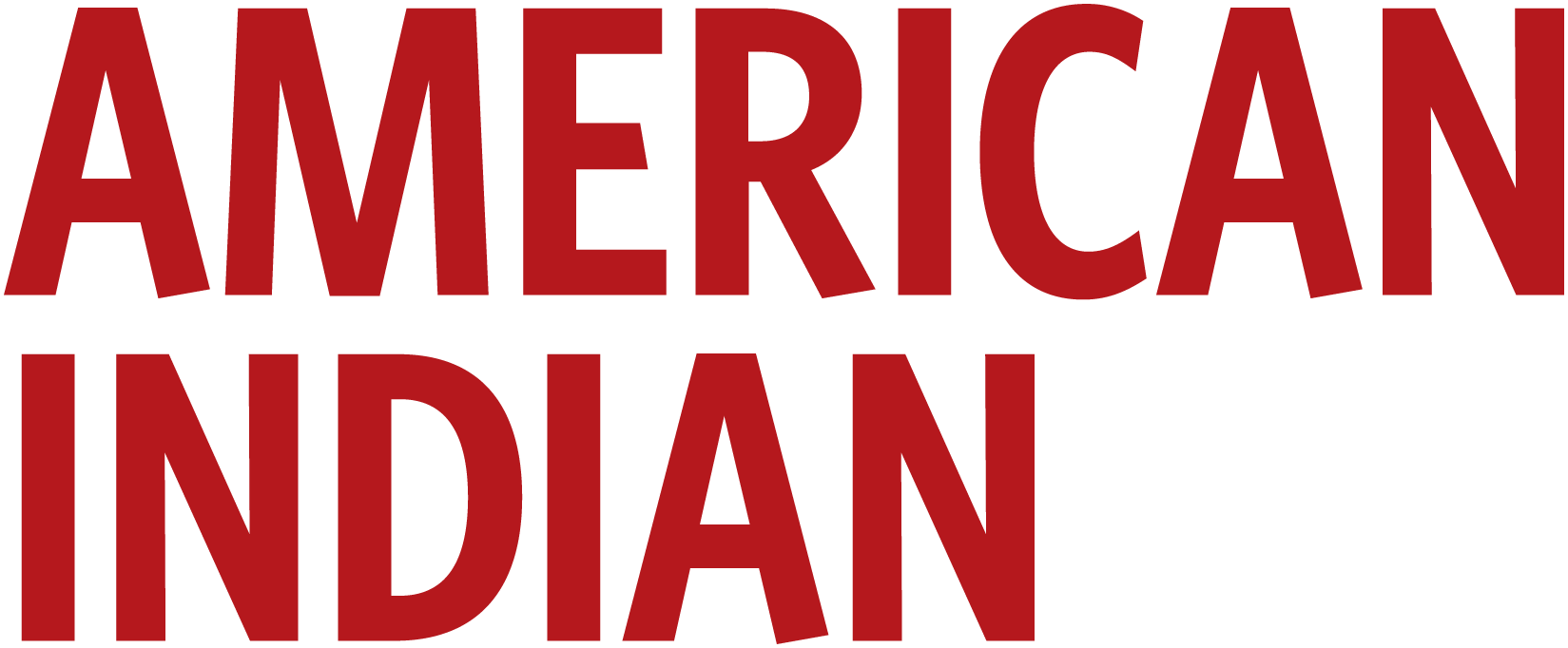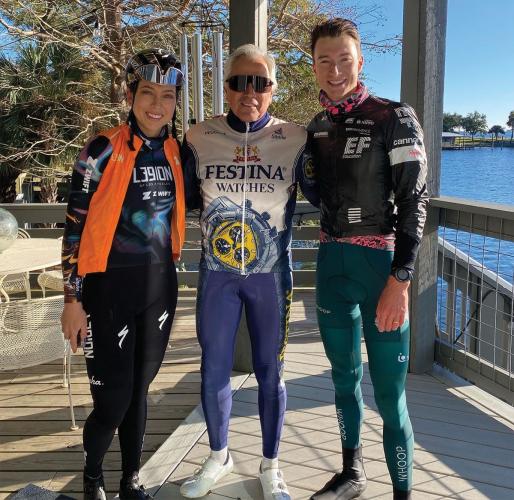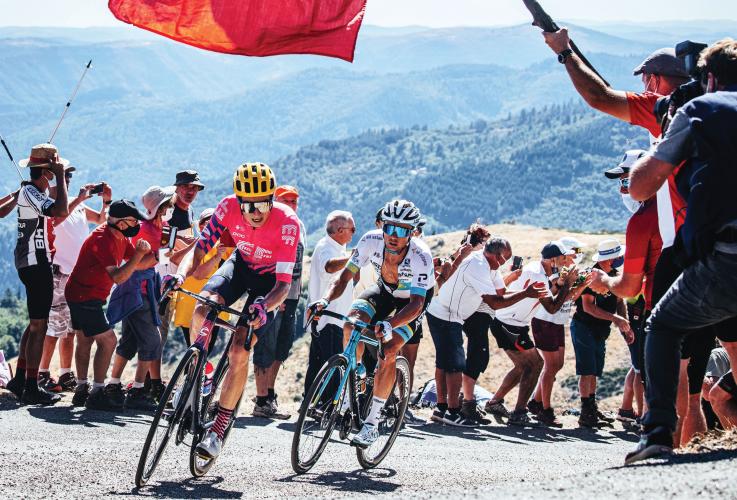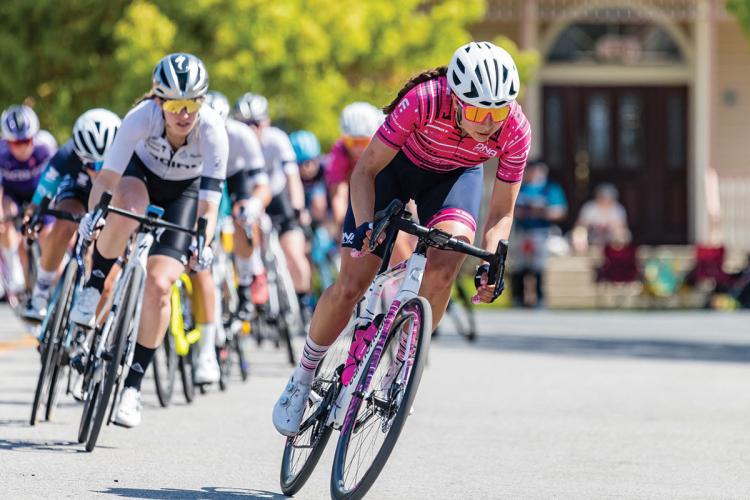The Oneida sister and brother duo Neilson and Shayna Powless are taking the cycling world by storm. Neilson rides for the international EF Education-EasyPost Team in the Union Cycliste Internationale’s (UCI) World Tour, the highest level of professional cycling. He finished 12th in the 2022 Tour de France—the first American Indian to compete in the race—and he is is consistently ranked among the top 25 cyclists in the world. Shayna rides for DNA Pro Cycling in the UCI Continental Tour and competes for the U.S. Cycling National Team in international competitions.
Bicycle racing began in the middle of the 19th century with the first organized race taking place in Paris in 1868. The sport has been included in the summer Olympic Games since the modern games began in 1896. It’s governing body, UCI, was founded in 1900 in France. The sport has grown to include many types of racing on many kinds of surfaces, from flat circular tracks to gravel and dirt roads and moutains to steeply banked tracks known as velodromes and cyclocross tracks with obstacles. Races vary in duration and length from a few-minute sprint on a 250-meter (about 820-feet) track to multiday tours such as the Tour de France, which lasts three weeks and crosses the entire country.
Yet in spite of cycling now holding competitions in almost every country, the sport has historically been dominated by and most popular in western Europe. With some exceptions—such as Black world champion Major Taylor at the turn of the 20th century and Cole House, a distant Oneida relative of the Powlesses who won the prestigious U23 Waregem in Belgium in 2009—few other cyclists of color have reached as high of a level of competition as Neilson and Shayna.
Growing up outside Sacramento, California, the young athletes came by their talent naturally. Their mother, Jen Allred, is a collegiate track and field coach. From Guam, she represented her home country in the marathon event in the 1992 Olympics and competed in seven World Athletics Championships, winning three gold medals and a silver at the South Pacific Games. Their father, Jack Powless (Oneida), was a nationally ranked triathlete and served as a high school and college coach before helping to train his son and daughter in their early career.
The siblings competed in track and field, cross-country, triathlons and mountain biking while in high school. Shayna still holds her school’s track record in the mile race, and Neilson excelled at running cross-country. “I enjoyed cross-country the most,” he said. “I just feel like the community that came along with it was so much fun.”
Neilson realized that he also excelled in cycling. “I started racing some mountain bike races that had bigger field sizes, and you know I started winning a couple local races,” he said. “But once you get the feeling of winning a bike race, it felt really cool.” He started looking for the most challenging races.
Neilson did well enough to get placed on a domestic developmental team to train young riders and eventually was picked up by a Dutch professional team. In 2018 he moved to the Netherlands, where the 22-year-old experienced culture shock and struggled to learn a new language. “You’re also moving away from home, away from your family and you have to figure out how do I get a residence? How do I get a visa? How do I make sure I am healthy between races?” In 2020, he joined the EF Education-EasyPost team and has since flourished. He won the Clásica de San Sebastián in 2021 and the Japan Cup in 2022.
Also while in high school, Shayna realized that the sport she enjoyed the most and she excelled at was cycling. In 2013, the then 19-year-old won the National Mountain Biking U23 Championship. She also enrolled at the University of California, Los Angeles, where she started competing on its road cycling team.
Since graduating in 2016, Shayna has been racing professionally in track, road, gravel and mountain bike races. In 2022, Shayna began competing as part of the U.S. national team, racing on velodrome tracks. Belonging to the U.S. team has taken her to many countries, including Indonesia and Egypt. She is now on the UCI Continental Circuit for the 2023 season, and recently won the green jersey for most points at the Tour of the Gila road race in New Mexico.
Yet Native youth trying to get into the sport face many hurdles, including prohibitive bike and gear costs, limited access to bike shops, teams and races, gatekeeping by the established cycling profession as well as a lack of a cycling culture in Indigenous communities. In 2020, with the national reckoning on racial justice following the murders of George Floyd, Breonna Taylor and Ahmaud Arbery, Neilson’s team EF Education-EasyPost, Cannondale and USA Cycling came together to create a grant program to promote diversity in cycling. The initiative has provided bikes, equipment and funds to start cycling teams at historically Black as well as tribal colleges and universities. This has helped the Institute of American Indian Arts and the Navajo Technical University to start collegiate cycling teams.
“One of the biggest barriers [to entering cycling] is lack of resources,” Shayna said. “I feel this drive to kind of help alleviate that barrier.” Shayna and her fiancé, NFL player Eli Ankou (Ojibwe/Dokis First Nation), started the Dream Catcher Foundation in 2018 to empower Native American children. In 2022, Shayna and the foundation conducted a cycling clinic to teach youth of the Seneca Nation in New York how to bike, including donating 100 bikes and helmets to children on the reservation. The foundation also sheds light on the epidemic of missing and murdered Indigenous people. She said, “It’s something both Eli and I feel like not a lot of people know about.”
Neilson’s EF Education-EasyPost team is also trying to diversify professional cycling. According to Neilson, his team is “the most diverse team in the World Tour in terms of different nations represented.” Likewise, L39ION, the team Shayna rode for during the 2022 seasons was founded in Los Angeles by Cory and Justin Williams, Black brothers with the goal of promoting diversity in cycling. Community engagement, such as hosting community rides, is an important part of L39ION’s strategy to encourage people of color to start cycling.
Efforts to diversify cycling along with Neilson’s and Shayna’s success may open more opportunities for the next generation of Black, Indigenous and other cyclists of color. Neilson said, “I hope that if there’s any Native athletes or Native kids out there watching the Tour de France, they’ll see this as an example of a path that’s been already paved.”



